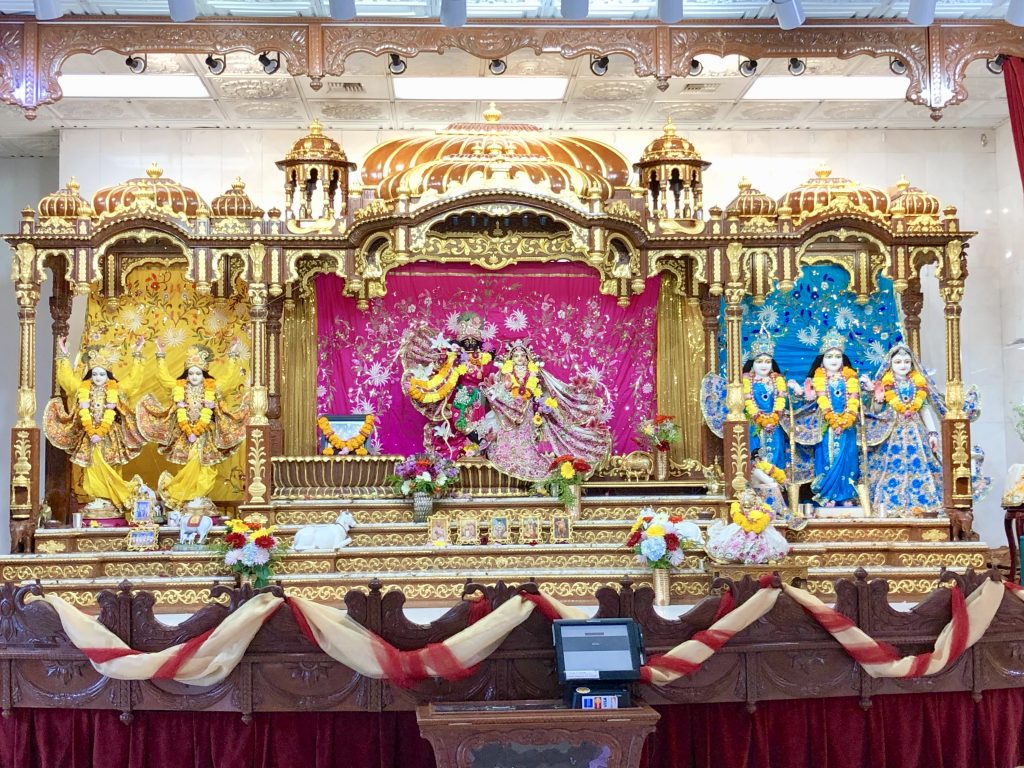
The main cake featured the name “Prabhupada” cut into individual letters. These were surrounded by twenty-six small cakes, each with one of his qualities artfully inscribed upon it.
Websites from the ISKCON Universe


It was wonderful to visit the Seattle temple again. As always, Their Lordships, Sri Sri Radha Nila Madhava, Sri Sri Gaura Nitai, Sri Sita, Rama, Laksman, Hanuman were as beautiful as ever.
The devotees told me that the Krsna Janmastami festival was the biggest ever with around 20,000 people attending over two days. Srila Prabhupada’s Vyasapuja was also blissful and for part of the celebration they took his murti on a palanquin circumambulating the temple.

 By Vijaya das
By Vijaya das In July, the two main UK temples, Bhaktivedanta Manor and London-Soho, had a great month. They had a summer marathon (see att. image) as they celebrate fifty years of Hare Krishna culture in the UK this year. The Manor did 6,154 book points, a 234% increase, and London did 5,297 book points, a 116% increase. These results made them the two top temples in Europe. These two temples have a special place in Srila Prabhupada’s heart. Sri Sri Radha—London-Isvara were transcendentally kidnapped by Srila Prabhupada, and Bhaktivedanta Manor was the last temple in the West he visited. Many book distributors from Europe went to visit him at that time and were glad they did, because for most it was the last time they saw him. Continue reading "WSN July 2019 – World Sankirtan Newsletter – Manor: 234% increase, London :116% increase!
→ Dandavats"

Durban Krishna News!
The Greening of Govinda’s!
No plastic bags & no plastic straws at Govinda’s!
Sri Sri Radha Radhanath Temple takes a small step in our bid to reduce single-use plastic. Another great reason to shop at Govinda’s Restaurant!

123rd Vyasa Puja celebration of Srila Prabhupada at
Iskcon Juhu Temple (Album of photos)
Srila Prabhupada: “For one who wants liberation from the fruitive reactions of material activities, the chanting of the Hare Krishna mantra, or glorification of the name, fame and pastimes of the Lord, is recommended as the most perfect process of atonement because such chanting eradicates the dirt from one’s heart completely.” (Srimad-Bhagavatam, 6.2.12)
In this video,HH Jayapataka Swami recalls on Srila Prabhupada’s pastimes at his room at Lotus building. This is where Srila Prabhupada translated books, waking up late at night. Srila Prabhupada Nectar – Sri Mayapur Meditation Srila Prabhupada Nectar – Sri Mayapur Meditation by His Holiness Jayapataka Swami Maharaja. Posted by Jayapataka Swami on Saturday, […]
The post Srila Prabhupada quarters at Lotus building Video! appeared first on Mayapur.com.
Answer Podcast
The post Why does God give some people an evil mind? appeared first on The Spiritual Scientist.

Alachua, Florida-Jahnavi Haggard, former Executive Director of Children of Krishna, a non-profit organization formed in 1996 to support second generation Krishna youth with grants for education and counseling, passed away on Saturday, August 9th, at the age of 36. She died at her home in Alachua, Florida, from a heart attack resulting from complications of her life-long struggle with diabetes.

The love of Kubja, the Queens and the gopis - Zoom conference of HH Sivarama Swami with English speakers (video)
HH Sivarama S...

Srila Prabhupada to Brahmananda: Your mother was very angry upon us. [laughter] You know that? When she came to see me, I told, “Mrs. Bruce, can you give me some money?” [laughing] [imitating angry woman’s voice:] “I have given you two sons!” [laughter] She was very angry. “Still you want money?” [laughter] And “That’s all right.”

“Communication is the key to healthy relationships.” If we are truly serious about someone’s presence in our lives, then no matter how challenging, we will make an endeavor to contribute all we can and more to share our grievances and good news with them. Spirituality is a key contributing factor to our sense of self. Regarding matters of faith, ancient Vedic texts speak of vandanam or prayer as a means of communication with the Lord.

In the U.S., SeaWorld Parks & Entertainment, which has SeaWorld parks in California, Florida and Texas, announced in 2016 that it would stop breeding captive killer whales and shift its focus to marine mammal rescue operations.

If we had a rand for every time we felt discouraged and aimless in our spheres of livelihood, we would probably be well-off by now and ready to take early retirement. Srila Prabhupada explains that everyone has a prescribed duty according to the four social dispositions; namely the priestly, warriors, merchants, and labourers. Those who properly perform their prescribed duties as an offering to God “live peacefully and are not disturbed by material conditions.” Thus they achieve the highest perfection of life. To see the truth behind this precept we learn from a scene in the life of the great vulture king, Jatayu.

Nestled in beautiful and tranquil New Goloka Dham, Hillsborough, North Carolina, USA, home of Sri-Sri Radha Golokananda, the BKG Academy is a homeschooling co-operative, which has continually provided holistic and individualized education to its students. For more information please contact campakaf@gmail.com or lilasaktidd@gmail.com.

Vaisnava seva was released in 2000 and it was the first ever studio album by Kadamba Kanana Swami. It proved to be a classic, as it is still the long time favorite of many! To date, it has only been available as a digital album but now…
We are proud to present the re-release of Vaisnava seva on CD with new artwork (by Sandhini) and with all the favorite tracks of yore! Let yourself be blown away by Nrsimha pranama with a rocking electric guitar on track 11 and relish the upbeat Mahamantra on track 10. Check out this album to sooth your ears.
Dear Vaisnavas,
I made this CD on the request of many devotees, I am offering it to you and hope you will find it to be inspiring.
Vaisnava seva –
In the Srimad Bhagavatam, it is said that by Vaisnava Seva one may develop a taste for devotional service.
The new Vaisnava seva CD is now available in the shop.

The article " Vaisnava seva on CD " was published on KKSBlog.

Janmastami 2019 original theatrical play by kids in the Hare Krishna temple of Melbourne (8 min. video)

BKG Academy is Now in its 5th Year!
Nestled in beautiful and tranquil New Goloka Dham, Hillsborough, North Carolina, home of Sri-Sri Radha Golokananda, the BKG Academy is a homeschooling co-operative which has continually provided holistic and individualized education to its students.
 Today I heard a lively argument between Srila Prabhupada and Dr. Patel on a morning walk on Juhu Beach, February 23, 1974. Srila Prabhupada was criticizing so-called gurus who are actually Mayavadis and say, “I am God. Let me now have rasa dance. Send your children. Send your wife, send your daughter. We’ll dance.” “These are all rascals,” Prabhupada said. “Mayavadis. Mayavadi-bhasya sunile haya sarva-nasa. This is the statement of Chaitanya Mahaprabhu. As soon as one hears the statements of Mayavadis, he’s doomed; he’s finished.”
Today I heard a lively argument between Srila Prabhupada and Dr. Patel on a morning walk on Juhu Beach, February 23, 1974. Srila Prabhupada was criticizing so-called gurus who are actually Mayavadis and say, “I am God. Let me now have rasa dance. Send your children. Send your wife, send your daughter. We’ll dance.” “These are all rascals,” Prabhupada said. “Mayavadis. Mayavadi-bhasya sunile haya sarva-nasa. This is the statement of Chaitanya Mahaprabhu. As soon as one hears the statements of Mayavadis, he’s doomed; he’s finished.”
Dr. Patel objected: “You have been bracketing so many good people like that, with the bad, and I feel strongly—”
“Where is good people?” Prabhupada exclaimed. “Where is good people? All rascals! Let them come. Let them come. Yes! I shall kick on their face! I am so strong. Where is good man?”
“You see—”
“I have already kicked that . . . What is that?”
“Bala Yogi,” Tamal Krishna answered.
“Yes. He’s a dog. I said in a public meeting. So, we have got some discrimination. This is our only point: If anybody is a Mayavadi, he’s a dog. Kick him on his face—that’s all.”
“What do you mean by Mayavadi?” Dr. Patel asked.
“Mayavadi means who thinks that Krishna is different from His body. That is Mayavadi. They think that Krishna comes with a ‘maya body.’ Therefore they are Mayavadis.”
Dr. Patel began to eulogize some Mayavadis, and Prabhupada pointed out their defects.
“You are a guru,” Dr. Patel said. “so I don’t want to contradict you. I am going.”
“Then you have got some selection of your own.”
“I have no selection.”
“I have to tell the truth. You may like or not like, it doesn’t matter. It doesn’t matter. I have to say the truth. I am saying all over the world.”
I felt grateful to Srila Prabhupada that he spoke the truth all over the world, wherever he was, and thus saved us from being misled by so-called gurus and others who did not know or speak the truth. He was so strong.
—Giriraj Swami

ECO-Vrindaban Board Meeting Minutes 06/16/2019
Mission Statement: ECO-Vrindaban promotes cow protection, local agriculture, and above all, loving Krishna, as envisioned by Srila Prabhupada, ISKCON New Vrindaban’s Founder-Acharya.
Participating Directors: Anuttama (partial attendance), Chaitanya Mangala, Jamuna Jivani (board secretary), Makara (chair), Olivia (partial attendance), Ranaka, and Vraja.
Participating Advisors: Kripamaya
1. Ranaka’s Monthly Report
Lalita Gopi (Temple Barn)
Ray: General Farmhand
Caitanya Bhagavat (Nandagram and Bahulaban)
Suchandra
Teaching Garden:
Community Garden:
Vidya (Vidya’s Garden)
Lila (Nandagram Garden)
Ranaka: General Manager
2. Allegra as Advisor
WHEREAS: The ECO-V Board wishes to maintain a team of advisors.
RESOLVED: The Board designates Allegra Wiprud to the position of advisor through the end of 2019.
3. Prabhupada’s Palace Restoration Funding Request
WHEREAS: ECO-Vrindaban wishes to help renovate Srila Prabhupada’a preeminent samadhi in North America.
RESOLVED: The ECO-V board authorizes a grant up to $300K to ISKCON New Vrindaban for Prabhupada’s Palace roof restoration.
There are three terms the ECO-V Board highlight as part of this grant/loan:
To reach the previously requested $500K, up to $200K can be provided as a loan from ECO-V to INV, with loan details to be decided at a later date.
Answer Podcast
The post What is the scriptural view on political correctness? appeared first on The Spiritual Scientist.
Zack Richards and Chaitanya Mishra received first initiation and the names Vraja Mohana Dasa and Chaitanya Priya Dasi, and the sisters Priti Radhika Dasi and Priya Gopika Dasi were awarded second initiation.
Zack Richards and Chaitanya Mishra received first initiation and the names Vraja Mohana Dasa and Chaitanya Priya Dasi, and the sisters Priti Radhika Dasi and Priya Gopika Dasi were awarded second initiation.
Posted by Damodar Das on Wednesday, August 28, 2019
Audio
Initiation Ceremony talk (Right click to download)

BB Govinda Swami: I can still cook! (Album of photos)
Hare Krishna .. Good News .. I can still do it !!
Yesterday for Srila Prabhupada I prepared 1,000 boondi ladu that were “as good as ever” and 100 kg of bhaigun bharta that was really delicious.
Folks ..I guess I can still cook.
A late “Happy Srila Prabhupada Vyasa Puja to All.”
>

Srila Prabhupada’s Appearance Day 2019 at ISKCON-London (Album of photos)
Please find below photos from Srila Prabhupada’s Appearance Day 2019 at the ISKCON-London Radha Krishna Temple.
[Talk at Radha Krishna Mandir, Cambridge, Canada]
Podcast
Podcast Summary
Video:
The post How devotion and dedication can transform our life into an adventure appeared first on The Spiritual Scientist.
Answer Podcast
The post Most of my fears don’t actualize, but some do – how can we be prepared without becoming fearful? appeared first on The Spiritual Scientist.
[Sunday feast class at ISKCON, Toronto, Canada]
Podcast
Podcast Summary
Video:
The post Negative and positive thinking in spiritual life appeared first on The Spiritual Scientist.

Gold Coast Bhakti Centre Janmastami (Album of photos)
This year Bhakti Centre Gold Coast presented two Janmastamis. One at the Bhakti Centre in Surfers Paradise and one at the Arts Centre Pimpama, a northern suburb of the Gold Coast.
Over 600 guests attended the festivities over the two days. Special guests for the festivities were senior Prabhupad disciples HG Bhagavat Ashraya and HG Sarva Mangala Prabhus. There was ecstatic kirtan performed by Bhagavat Dey from Bombay and the local kirtaneers, Krishna Leela dance performances, abisheka of Sri Sri Radha Giridhari, distribution of maha prasadam and offerings of flowers to Srila Prabhupad. The Bhakti Centre Gold Coast community requests all the Vaisnavas to give their blessings so we can continue to serve Srila Prabhupada’s mission.

Dhama Seva at New Mayapura, France, August 14 by the devotee youth of the Europe Bus Tour 2019 (Album of photos)
Find them he...

(Kadamba Kanana Swami, 3 October 2018, Camp de Masque, Mauritius, Srimad Bhagavatam 1.1.1)
We see that the residents of Vrndavana may forget Krsna’s divine nature, but they never forget Krsna Himself. And that is the thing, we should always remember Krsna. So whether we come together with many and sit in a pandala and discuss how Krsna is the Supreme Personality of Godhead, or whether we are alone. There is no difference, because in reality, we are never alone. We are always with Krsna. In this way we realise that loneliness is actually maya. Loneliness is illusion. When we are feeling lonely, we are in illusion, because we are not understanding that Krsna is always with us at every moment.
The article " Loneliness is Maya " was published on KKSBlog.

My Initiation.
On August 15, 1968, in Montreal, I was initiated at the age of 16-an unqualified person meeting such a great and unprecedented saint as Srila Prabhupada. At the same time, the six pioneers from San Francisco, on their way to London received their Gayatri mantra, or second initiation.

Photos from Sri Krishna Janmashtami 2019 at ISKCON-London.
Srila Prabhupada: Sri Caitanya Mahaprabhu said, “Though the hearts of the gopis are like high-standing hills, they are inundated by the waves of the nectarean ocean of Krsna’s beauty. His sweet voice enters their ears and gives them transcendental bliss, the touch of His body is cooler than millions and millions of moons together, and the nectar of His bodily fragrance overfloods the entire world. O My dear friend, that Krsna, who is the son of Nanda Maharaja and whose lips are exactly like nectar, is attracting My five senses by force.” PURPORT This verse is found in the Govinda-lilamrta (8.3), by Srila Krsnadasa Kaviraja. Cc Antya 15.14

First Manado Jagannatha Ratha-yatra, Indonesia (Album of photos)
Thousands of residents crowded the Megamas area of Manado City, North Sulawesi watching the Manado Fiesta 2019. Along the way, the Manado Fiesta route took place lively. Thousands of people poured out to watch the Fisco program. The road that became the route was crowded by people who wanted to see various regional groups from around Indonesia performed their cultures which took part in this year’s Manado Fiesta.

Celebration in Mayapur for the appearance of Srila Prabhupada with beautiful decorations (Album of photos)
Devotee: Is the pure devotee more merciful than Krsna? Prabhupada: Oh yes, yes. Because Visnu could not excuse him, but as soon as he came to Maharaja Ambarisa, fell down, and “You take all my assets of pious activities. You be saved immediately.” That is Vaisnava. When he begged, humble, “Maharaja Ambarisa, you save me, I am in danger.” “Yes, you take all my pious activities’ result. You be saved immediately.” That is devotee. Visnu refused, “No, I cannot give you protection.” Therefore he is more merciful, although he was attacked, he was harassed.
 My dear Gopal Krishna Maharaja,
My dear Gopal Krishna Maharaja,
Congratulations on your seventy-fifth appearance day!
My first vivid recollection of you is from 1973. I had heard about you—how you had studied at the Sorbonne in Paris and then at McGill University in Montreal and then held responsible positions with Pepsi Cola and Bristol-Myers, and how you would come to the New York temple every day and were so humble that you would go around the temple room and offer obeisances to all the spiritual paintings on the walls. So, I had heard about you before I actually met you.
For some weeks in 1973 Srila Prabhupada was staying at Seth Bhogilal Patel’s palatial home in Walkeshwar, South Bombay, and you, visiting India, came to meet with him. I was struck by the way the two of you related with each other. Srila Prabhupada dealt with you differently than he dealt with the rest of us disciples. I immediately understood that there was something special about you.
Two years later, Tamal Krishna Goswami, who had been the GBC for India, returned to America and began the Radha-Damodar Party, and Srila Prabhupada asked you to replace him. Srila Prabhupada had told me that you had worked for a major international company and had your own private office and a car. I was meeting important people in Bombay, and Srila Prabhupada wanted to impress upon me your competence and status.
Soon after you arrived in Juhu, you wanted to visit your mother, who lived nearby in Santa Cruz, and you invited me to accompany you. Again I was struck by your polite and gentle manner, and by how considerate and respectful you were with her. I was impressed. When most of us youths in Europe and America became devotees, it was hard for us to visit our parents, because most of them did not understand Krishna consciousness and were quite hostile to our becoming devotees. So it was unusual—unique, in fact—for me to see such warmth and mutual respect between a nondevotee (albeit Hindu) parent and a devotee child.
Juhu was one of Srila Prabhupada’s main projects, and he faced many challenges there—first in getting the land, then in getting the permission to build the temple, and then in actually building the temple—and you and I, under Srila Prabhupada’s guidance, worked together to deal with them. We complemented each other and thus formed an effective team. We had our own individual approaches and strengths and weaknesses, but we were brought together and bound together by Srila Prabhupada’s love and mercy, and by our common love for and surrender to His Divine Grace. We dealt with many challenges and intrigues together. I cannot count the times we went together to legal firms, accountants’ offices, government departments, and social and political leaders’ headquarters to get information and support for our efforts on Srila Prabhupada and Sri Sri Radha-Rasabihari’s behalf. And eventually, by their grace, things turned around in our favor and we finally got the permission to build the temple—and built it.
Srila Prabhupada said that ISKCON was his body, the BBT his heart, and the monies collected his blood. And he entrusted the most important business of publishing and distributing
his books in India to you. He was always asking you, “Where is book? Where is book?” and when you presented him with a new book, he felt great satisfaction in his heart. In 1977, at a most oppressive and repressive time in Soviet history, you brought Srila Prabhupada’s books behind the Iron Curtain, very intelligently and resourcefully introducing them through a book fair in Moscow. And just one day before he left this world, Srila Prabhupada asked for the certificate to be read to his godbrothers—“Books in the service of peace and progress. A diploma for the Bhaktivedanta Book Trust, Bombay, given by the First Moscow International Book Fair, USSR.” How proud and pleased he must have felt.
You always had a tremendous capacity for managing and doing business. Yet at a certain point a deep desire formed within your heart that you wanted to preach. In Juhu you kept talking about how you wanted to go out and give lectures. But you were so fully engaged with managerial duties, you hardly had time. Still, it was such a profound desire that eventually it was realized. Especially after Srila Prabhupada left, you became one of the most enthusiastic and dynamic speakers of krsna-katha in the movement.
After you began to initiate, you were given the honorific “Bhagavatapada.” Bhagavata has two meanings: the book Bhagavata, Srimad-Bhagavatam, and the person bhagavata, in particular, for us, Srila Prabhupada. And pada means “foot,” or “at the feet of.” You are always at the feet of Srila Prabhupada and are always engaged in the service of Srimad-Bhagavatam by publishing it and distributing it, and by preaching it and living it.
Much has been said about your many wonderful qualities and activities: your impeccable sadhana, your love for and service to your deities, your care for devotees (especially your godbrothers), your expanding book distribution and developing major projects in India and throughout the world, your cultivating and engaging important and influential people, your tireless traveling and extending yourself for the sake of others, your resilience and perseverance in the face of physical illness and challenges, and your staunch and loyal dedication and enthusiastic loving service to Srila Prabhupada.
Although you and I were both attached to Srila Prabhupada and his mission, sometimes we had differences in our understandings, or approaches. I tended to be more idealistic and rigid, and you more practical and flexible. So we had differences on the means—what would be most effective or beneficial—but never on the ultimate goal: to please Srila Prabhupada and spread Krishna consciousness. You commented, “Giriraj and I are like a Vedic couple. We may have differences, but there is no question of divorce.” This statement is a testament to your dedication to Srila Prabhupada—and your kindness upon me, that you tolerated me with all my faults, for the sake of keeping me engaged in Srila Prabhupada’s service in Bombay.
In the last months, as I am completing my book about Srila Prabhupada and Juhu, I’ll Build You a Temple: A Good Fight and a Promise Fulfilled, we have come even closer. You were kind enough to write a foreword for the book and to offer to encourage the temples in India to distribute it. And nowadays, I often say, “Gopal Krishna Maharaja commented, ‘Giriraj and I are like a Vedic couple. We may have differences, but there is no question of divorce’—but now we are in love.”
On this glorious occasion I appeal to all present—including myself—to imbibe your spirit, to be prepared to make any sacrifice, go to any extreme, and expend any amount of energy for the sake of serving Srila Prabhupada and Sri Chaitanya Mahaprabhu.
I am very honored and humbled to have this opportunity to express some of my appreciation and affection for you, my dear godbrother. From the beginning, I saw exceptional good qualities in you, and by your service to our spiritual master, your good qualities have multiplied and matured. You are a beacon of light in this dark world of Kali-yuga.
As stated in Srimad-Bhagavatam:
krsne sva-dhamopagate
dharma-jnanadibhih saha
kalau nasta-drsam esa
puranarko ’dhunoditah
“This Bhagavata Purana is as brilliant as the sun, and it has arisen just after the departure of Lord Krsna to His own abode, accompanied by religion, knowledge, etc. Persons who have lost their vision due to the dense darkness of ignorance in the age of Kali shall get light from this Purana.” (SB 1.3.43)
On this occasion I pray that you will have many, many more years of good health for serving Srila Prabhupada, the devotees, and the mission, that we both will continue to serve Srila Prabhupada together even after leaving our present bodies, by his—and your—divine grace.
—Giriraj Swami